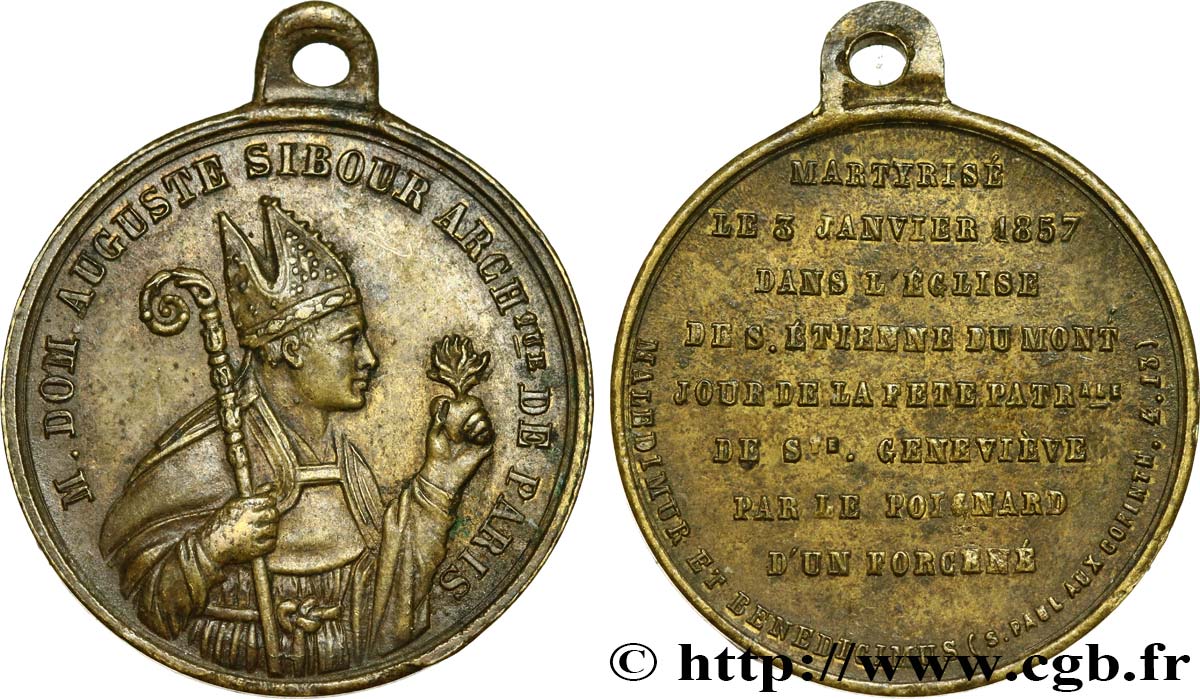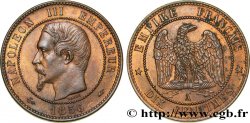fme_466612 - SECOND EMPIRE Médaillette pour l’archevêque Sibour
недоступный.
Товар уже продан в нашем интернет-магазине (2021)
Цена: : 25.00 €
Товар уже продан в нашем интернет-магазине (2021)
Цена: : 25.00 €
Тип Médaillette pour l’archevêque Sibour
Дата: 1857
Монетный двор / Город: 75 - Paris
Металл: brass
Диаметр: 27 mm
Ориентация осей монеты: 12 h.
Вес: 3,82 g.
Век: lisse
Комментарии о состоянии
Patine sombre hétérogène avec de petites taches
Лицевая сторона
Аверс: легенда: M. DOM AUGUSTE SIBOUR ARCHQUE DE PARIS.
Аверс: описание: Buste à droit de l’archevêque tenant une crosse et un coeur saignant.
Обратная сторона
Реверс: легенда: MARTYRISÉ / LE 3 JANVIER 1857 / DANS L’ÉGLISE / DE S. ETIENNE DU MONT / JOUR DE LA FÊTE PATRALE / DE STE. GENEVIEVE / PAR LE POIGNARD / D’UN FORCENÉ // MALEDIMUR ET BENEDICIMUS (S. PAUL AUX CORINTH. 4. 13).
Реверс: Описание: Légende en 9 lignes horizontales.
Комментарий
Marie Dominique Auguste Sibour, né à Saint-Paul-Trois-Châteaux (Drôme), le 4 août 1792, mort assassiné à Paris, le 3 janvier 1857, est un ecclésiastique français, évêque du diocèse de Digne (1840-1848) puis archevêque de Paris (1848-1857).
Il est poignardé en pleine église, à l'issue d'une cérémonie le 3 janvier 1857 par Jean-Louis Verger ancien curé, visiblement déséquilibré, et déjà sanctionné par l’Église. En plus d'avoir eu plusieurs problèmes avec les autorités religieuses (avant cette affaire) qui lui ont valu une série de sanctions, M. Verger avait déjà eu maille à partir avec la justice pour plusieurs affaires de vols ou de scandales sur la voie publique. Lors d'un précédent procès un médecin avait déclaré « Il a toute sa lucidité, mais c'est un homme dangereux ». Son procès, qui se conclura par sa condamnation et son exécution le 30 janvier 1857, donnera lieu à de nouveaux esclandres de la part du prévenu..
Il est poignardé en pleine église, à l'issue d'une cérémonie le 3 janvier 1857 par Jean-Louis Verger ancien curé, visiblement déséquilibré, et déjà sanctionné par l’Église. En plus d'avoir eu plusieurs problèmes avec les autorités religieuses (avant cette affaire) qui lui ont valu une série de sanctions, M. Verger avait déjà eu maille à partir avec la justice pour plusieurs affaires de vols ou de scandales sur la voie publique. Lors d'un précédent procès un médecin avait déclaré « Il a toute sa lucidité, mais c'est un homme dangereux ». Son procès, qui se conclura par sa condamnation et son exécution le 30 janvier 1857, donnera lieu à de nouveaux esclandres de la part du prévenu..








 Cообщить об ошибке
Cообщить об ошибке Распечатать страницу
Распечатать страницу Отправить мой выбор
Отправить мой выбор Задать вопрос
Задать вопрос Consign / sell
Consign / sell
 Информация
Информация












